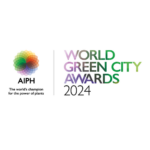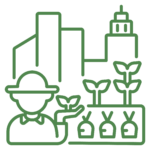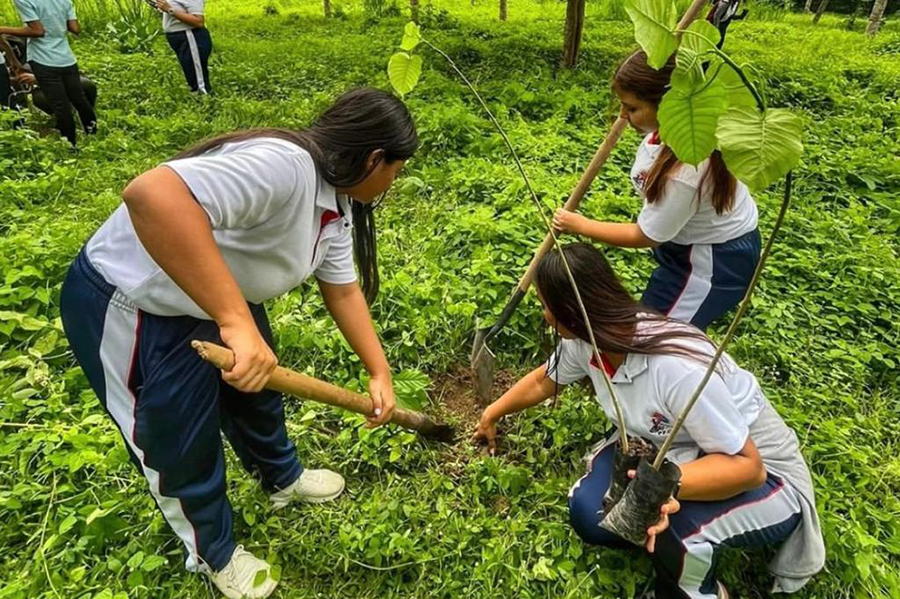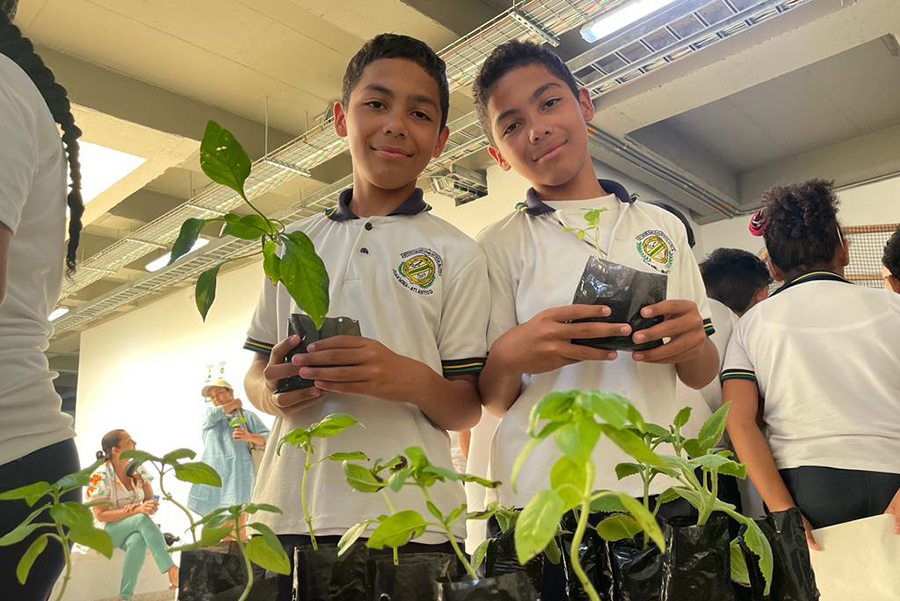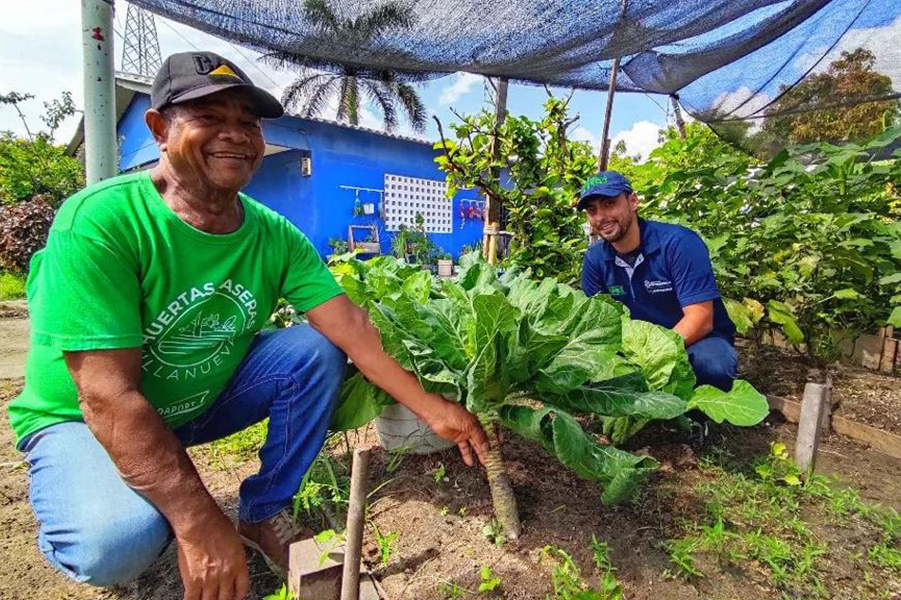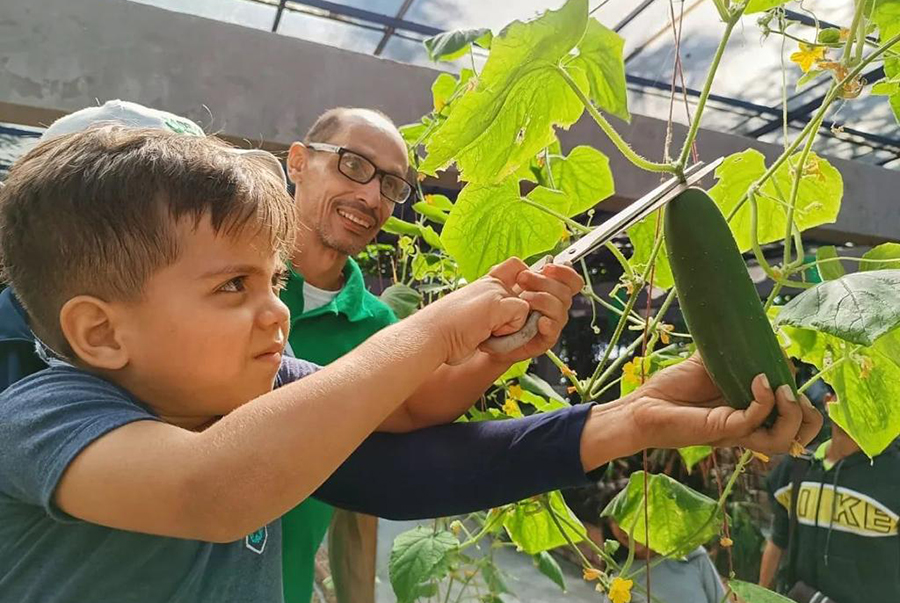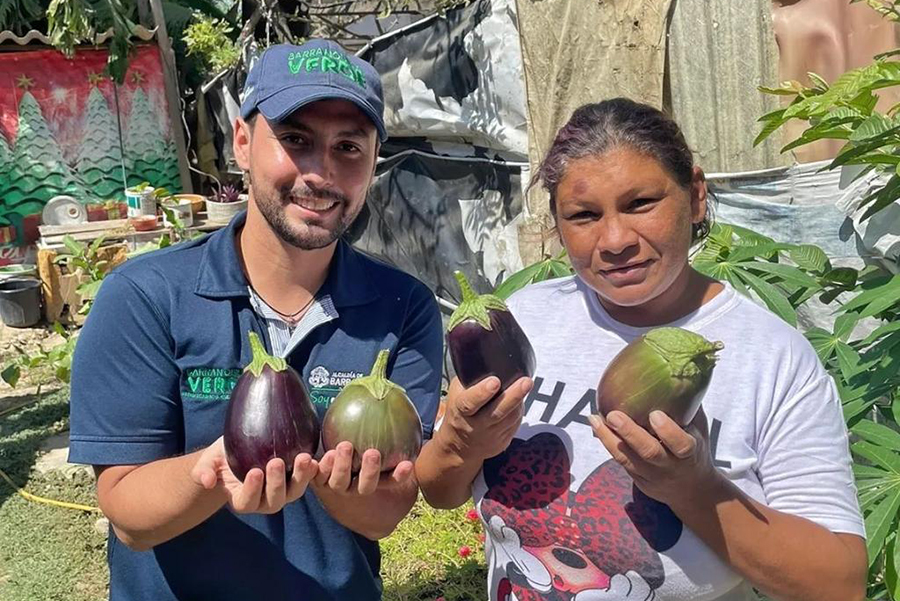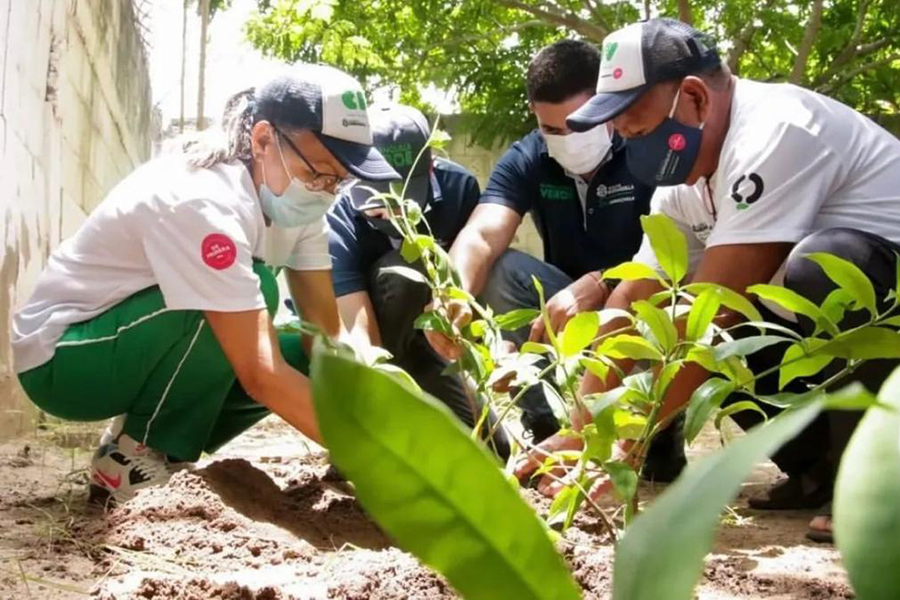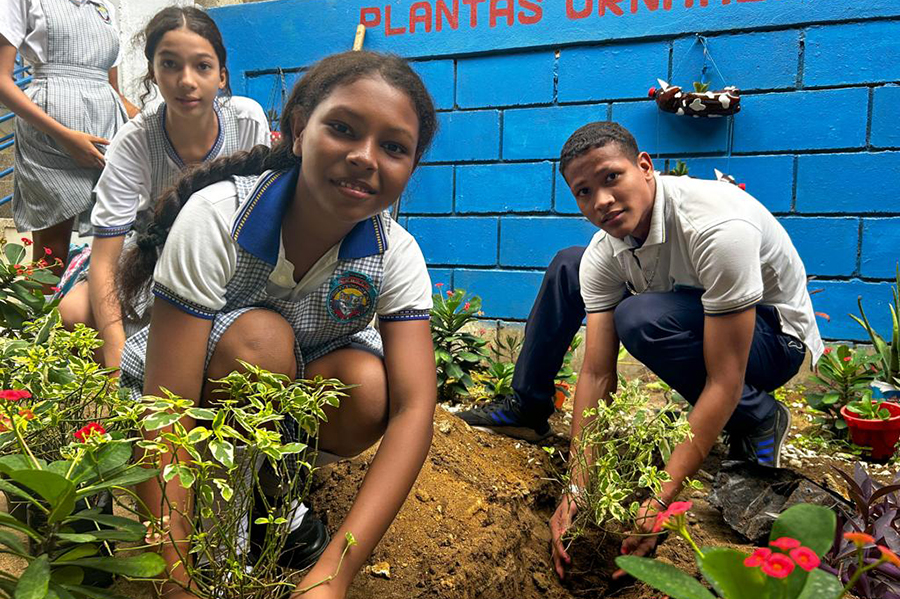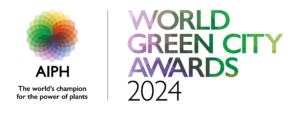Benefits of Urban Greening
Harnessing the Power of Plants
The BAQ-Cultiva programme seeks to be recognised in the national context as a pioneer in complying with international standards in the protection of natural resources and environmental sustainability.
At the beginning of the Urban Forestry project, a manual of good planting practices and an inventory of more than 50 local species of fruit, vegetables, aromatic/medicinal and pollinating ornamental species was drawn up. This was supported by universities with academic programmes in Engineering and Biology, exchange students from related careers and also advice from nurseries to contextualise the native species and their importance in the flora and fauna component for the correct harmony of the ecosystems.
Delivering Multiple Benefits
During the 37th National Cattle Breeders’ Congress, the former Minister of the Environment and Sustainable Development, Ricardo José Lozano Picón, said that within the national development plan there are “commitments on sustainable livestock farming that are the responsibility of the Ministry of Agriculture, i.e. there should be more than 144,000 hectares of sustainable livestock farming”.
The BAQCultiva project added its interventions to meet this goal of planting 180 million native trees that serve for the restoration of the country and the fight against deforestation.
Barranquilla Verde promotes, guides and regulates the protection of natural resources and their sustainability as a guarantee of the quality of life of citizens; thus developing environmental and social programmes that involve the participation of communities in the construction of a “Biodiverciudad”.
Among these, we can highlight the BAQCultiva programme, which is subject to compliance with the new policies established in the District’s Development Plan. Due to the great work carried out and welcomed by the communities from 2018 to date, the interest of the last administrations of the District Mayor’s Office has been awakened so that this process can be carried out in a sustainable manner. It is necessary to allow continuity and strengthening of the initiative, hoping that soon BAQCultiva will be recognised and included as a Public Policy of the District’s Action Plan to meet two primary needs: Food Security in the communities and recovery of urban ecosystems.
The City’s Bold and Innovative Vision
BAQ-Cultiva seeks to support the population of the District in their food security and productive reforestation, through the creation of spaces where the community can interact with each other and experience urban agriculture under the union. This is why the programme has the First Centre for Interaction and Environmental Production VIVERDE.
VIVERDE consists of an area of 1,582 m2 with a greenhouse-type infrastructure of 590 m2 where users are trained through experimentation in environmental education through good practices at domestic and industrial level. Urban agriculture workshops are also held with more than 50 fruit, aromatic/medicinal and ornamental pollinating species to promote food production at home, contributing to the mitigation of the effects of climate change.
In addition to benefiting the environment, the project indirectly provides a space that promotes therapy, community integration and improved coexistence in the environment. As an environmental education strategy, a mural of the richness of the flora and fauna in the Casita Ambiental was created to show the richness of the ecosystems of the Caribbean region.
To improve its service to the community, an automated irrigation system with solar energy was installed, making VIVERDE the first centre in the District where the use and exploitation of renewable energies from non-conventional transition systems will be explained to the communities.
Partnerships and Collaboration
In search of continuing to build a “Biodiverciudad”, Barranquilla Verde achieved an alliance with the SENA (National Learning Service), specifically with its Centre for Agro-ecological and Agro-industrial Development – CEDAGRO. In order to further strengthen the implementation of Urban Agriculture and Forestry in the District, allowing within the facilities of VIVERDE in the Botanical Garden Ecopark, CEDAGRO began the technical training program certifiable in Nursery Management, having as added value an emphasis on urban agriculture with a training period of 1 year. The first promotion is made up of a group of 25 people from different places such as Civil Defence Volunteers, the Presbyterian Church and the community in general. Thanks to the offer of this technical career, VIVERDE has become a formal education centre and envisions that people will find in urban agriculture job opportunities that they can devote themselves to in the future.
From 2020 to 2023, 218 families have benefited from the Home Gardens project achieved under the management of Barranquilla Verde and alliances with private sector professionals at national and international levels (FUNDAPORT Foundation, the Port of Barranquilla, FINSOCIAL Foundation, UN-HABITAT, UNHCR and IOM) for the sponsorship of some families, contributing to their social and environmental responsibility programmes.
We are working with TRANSMETRO, the city’s public transport service, to plant, beautify and improve its trunk services and service areas by revegetating spaces. The company’s civil works and communications engineers helped us to carry out the planting process and related activities.
Addressing Urban Challenges
The Issue
Based on the World Food Summit Plan of Action, the FAO defines food security as “when all people at all times have physical and economic access to sufficient, safe and nutritious food to meet their dietary needs and food preferences for an active and healthy life”.
In 2015, the regional picture in the Caribbean was alarming, as the food insecurity figure rose to 65% (10% higher than the national figure), whereas for Barranquilla, it stood at 57.3% in that measurement. Between 2018 and 2019, only 22% of Barranquilleros claimed to consume three food rations a day, and by the end of 2020 and 2021, the figure increased to 38.5%. It is inevitable that this situation will worsen due to the ravages of the pandemic, insufficient social investment and the pressure of global warming on soils and watersheds.
On the other hand, due to the constant development of Barranquilla, the affectation of the vegetation cover is a difficult aspect to manage and avoid. Buildings are not planned with an environmentally friendly architectural design, causing green areas to disappear and bringing an increase in temperature that directly affects the inhabitants.
For this reason, local governments play a fundamental role in combating this problem, taking into account that identifying the causes, consequences and actors will allow the design and prioritisation of strategies aimed at guaranteeing the inalienable right to have access to adequate food and ensuring the conservation and restoration of urban ecosystems.
The Impact of the Issue
From the point of view of food security, if these conditions are not guaranteed, communities may be exposed to risks such as malnutrition and disease, which can generate social conflicts, with serious economic repercussions, as income generation and food security in family homes are directly proportional.
At the urban level, the impact of vegetation cover, either by its removal to make way for the development and growth of the city, inadequate architectural designs that lead to heat islands and the lack of awareness of people for their conversation, cause the balance in ecosystems to be broken. The services they provide at a general level (man-nature) are sources of greenhouse gas sinks and largely responsible for contributing to global warming, which is already known to affect natural resources in their biotic (fauna and flora) and abiotic (water, air, soil) components, posing a future threat to our quality of life.
A Nature Orientated Future
Food security and that people enjoy environments where their integrity is not affected, are first hand needs for the construction of resilient communities to environmental, social or economic problems. The BAQ-Cultiva Project, is committed to allowing the citizens of Barranquilla to be involved as responsible actors of change through education, delivery of tools and restoration of urban ecosystems with agriculture, forestry and landscaping.
Nature Positive Solutions
Implementation
In 2018 we started to deliver trees by way of compensation, following Resolution 256 of 2018 with which the update of the Environmental Compensation Manual of the Biotic component was adopted.
After 2020, with the pandemic, the need became more urgent, urban agriculture activities with direct contact with the population were strongly developed.
From 2020 to 2023, BAQ-Cultiva intervened through Home Gardens, School Gardens, Community Gardens and interventions in Rehabilitation Centres. Thanks to these initiatives, it was possible to first attend to vulnerable populations through the provision of inputs, training and monitoring so that each family can implement gardens in the backyards of their homes and be responsible for their own food production.
During the last two years, we have been transforming VIVERDE. Through the adaptations carried out by Air-e, the renovation of the facilities was achieved, specifically in the Mural of the richness of Flora and Fauna in the Environmental House, the perimeter enclosure of the greenhouse and the installation of the automated irrigation system with solar energy. Thanks to these modifications, VIVERDE became the first centre in the District where the use and exploitation of renewable energies from non-conventional systems will be explained to the communities.
In the coming years, we plan to have a Butterfly Farm to act in favour of the protection and conservation of pollinators, and a Vermicomposter for the use of organic waste, as well as implementing other spaces that increase the dimension of environmental education.
Feasibility
BAQ-Cultiva corresponds to a strategic line called “Integrated Management of Biodiversity and Ecosystem Services” of its programme “Conservation and Management In Situ and Ex Situ of the Biodiversity of the District of Barranquilla”. It is part of the mission activities of the Environmental Public Establishment Barranquilla Verde, thus ensuring resources for its operation during the administrations of the Mayor’s Office. In turn the Establishment allocates part of the resources for environmental compensation to strengthen the strategy.
On the other hand, in alliance with other departments of the Mayor’s Office, companies and/or foundations of the Public Sector, support is obtained to develop extension projects of BAQ-Cultiva such as the sponsorship of home, school and community gardens, delivery of ornamental plants and trees for the processes of reforestation and landscaping in different localities of the District.
Thanks to the success of BAQ-Cultiva from 2018 to date, it has been very well received by the communities, so in the medium or long term, this strategy will be considered as a public policy assumed by the administration of the District of Barranquilla to respond to the problems of food security and increase of vegetation cover as an action of resilience to climate change.
Multi-Stakeholder Support
BAQ-Cultiva intervened in the five localities of the District (Suroccidente, Suroriente, Norte-Centro Histórico, Metropolitana, Riomar) through the project’s home gardens, school gardens, community gardens, rehabilitation centres, and the Environmental Production Centre. Through the creation of these spaces, we aim to enable the community to interact with each other and experience urban agriculture under the union.
The dedicated team works directly with the communities by providing them with planting inputs to implement gardens within their homes and receive theoretical and practical training in urban agriculture. Four District Educational Institutions were trained in urban agriculture and by 2022 they will benefit from the construction and assembly of gardens within their facilities to enhance food security from early childhood. A vegetable garden was built in a halfway house for street dwellers. At the “El Buen Pastor” Women’s Rehabilitation Centre, new areas were replanted with biodiverse gardens and an internal vegetable garden is being built.
The BAQ-Cultiva project achieved an alliance with the SENA (National Learning Service), specifically with its Centre for Agro-ecological and Agro-industrial Development – CEDAGRO, and has also worked in coordination with other agencies of the district administration such as the Secretariat of Education, the Secretariat of Social Management, the Secretariat of Government, among others, to directly impact strategic and highly vulnerable sectors. On the other hand, the private sector has worked hand in hand with BAQ-Cultiva in its social responsibility, supporting and sponsoring on several occasions the implementation of actions related to urban agriculture and forestry.
Management and Maintenance
Sometimes, when we want to carry out interventions (activities, training, planting, etc.), the availability of spaces or areas is limited. Our partnerships with various actors in the city have allowed us to grow and move forward with the project. For example, we are working with Transmetro, the city’s public transport service, to plant and improve its trunk services and service areas by revegetating spaces.
We have also encountered economic difficulties in meeting the costs of maintenance and expansion of infrastructure in order to increase the supply of the VIVERDE greenhouse. But thanks to our partners such as Air-e, we are trying to provide the community with a larger, safer and more environmentally friendly space, using renewable technologies.
Sometimes in the development of training sessions we encounter difficulties regarding the availability of people. They may initially tell us that they are committed to the topics, but then they don’t have the time or the willingness to attend the training. To improve people’s experience, we try to provide a personalised service to the community. The greenhouse is open to the public on a walk-in basis from 8am to 2pm with access available all day by appointment (especially for groups of more than 10 people).
Thanks to this programme, we were able to secure the commitment of many households, due to a whole process of follow-up, accompaniment, monitoring and continuous learning carried out with them to ensure the good growth of the trees delivered or the effective functioning of the gardens installed.
Measuring and Reporting Impact
Monitoring Results
The protocols we implement to follow up on the BAQCultiva programme are mostly subjective. Following visits to our greenhouse or citizen participation in events, we conduct survey analyses, asking the community directly for their observations and expectations regarding their experience of the programme. On a daily basis, we collect comments on social media and respond to dedicated email requests. This follow-up happens mostly through social networks, working tables, and sharing PQRS (requests, complaints, claims and suggestions) so that the population is fully part of the initiatives.
By making repertoires and statistics to demonstrate the impact of BAQCultiva in the District, we also calculated the number of trees planted and the number of plants delivered, the number of beneficiaries touring the VIVERDE greenhouse. Based on these positive results for the community, it is hoped that the Environmental Authority’s BAQCultiva Programme will become more visible and recognised to the point where it becomes Public Policy in the District’s Action Plan to meet first hand needs: the restoration of urban ecosystems and food security in the communities.
Demonstrating Progress
Barranquilla Verde is working as a priority from September 2022 to be able to advance searches for calls for project awards and grants. We are always open to possible alliances with local actors (companies, foundations, associations, groups…) in order to improve the monitoring of our progress and to be able to access parts of our beneficiary population more easily.
With our quantitative results, we can assess the feasibility and the good impact they generate in the community. For example, we have been delivering 19,180 vegetable and aromatic seedlings, which represents a potential start for the effective implementation of urban agriculture in the city. The social cohesion that BAQCultiva displays, the good eating habits, good socio-environmental practices, culture and environmental education, etc., open doors for both locals and outsiders to join in this commitment and thus continue to expand all the work.
Measuring Impact
In order to monitor the results of BAQCultiva, two types of processes are carried out.
First, we made quantitative calculations to account for the programme’s impact on the Barranquilla community. Thus, we count 19,180 seedlings delivered in total between vegetables and aromatic plants for the implementation of gardens and self-production of food. To date 27,809 people have benefited and toured VIVERDE, planting workshops and participation in events. We have impacted 218 families who produce food in their homes through the home gardens project in four different locations in Barranquilla. We have also identified nine schools together with the Secretary of Education that are interested in planting trees.
Secondly, we qualitatively evaluate the construction of healthy habits, environmental practices, the use of free time for informal activities, the improvement of mental health or the level of wellbeing of the population. We measure these results and follow them up through the testimonies of our beneficiaries, and the visits we make to the homes in which we plant to see the level of appropriation of the plants and techniques by the family. Before accessing the benefit, a case study is made (how the space is, the courtyard, etc.) to get to know the land, have contact with the people and then be able to work together. Follow-up checks in the homes are done after three to six months, to find out how the garden or the planted tree is doing.
Learning and Transferability
Adaption and Enhancement
In monitoring the progress of our urban agriculture project, we realised that in the development of the training, we encountered difficulties related to the availability of our beneficiaries. In several cases, they initially expressed their commitment, but in order to carry out the training, it was difficult for them to find the time and willingness to attend. To respond to this difficulty, we have been working with schools and hand in hand with the Environmental Education programme of our Establishment to allow the garden to become a scenario where specialists from different subjects can impart knowledge in a playful and practical way.
Our urban forestry project has encountered difficulties regarding the availability of spaces to carry out planting interventions and related activities. In order to respond to this problem, we have been working in partnership with various district departments, schools, rehabilitation centres and other private actors to find more space to develop our actions. We have been improving the services of the greenhouse, using a solar-powered irrigation system and protecting the space. We want to continue to expand the VIVERDE greenhouse in order to be able to increase the offer, and to maintain the infrastructures we have encountered some economic difficulties to be able to meet these expenses.
Potential for Replication
The initial idea for the BAQ-Cultiva project came from a social need to give the community access to nature and plants. During the pandemic, Barranquilla Verde began by delivering home garden kits through a pilot plan. But with a high level of participation from families, we had to seek agreements with public and private sectors to respond. Local companies joined the project, complying with compensation mechanisms and their social responsibility. These partners became sponsors and started to deliver the home garden kits themselves.
At the district level, there is also the Siembra Barranquilla programme, working on tree planting and landscaping. In response to a call for proposals, this programme formed an alliance with the European Union and us to develop a line of work in urban agriculture focused on the creation of productive parks. Barranquilla Verde is aligned with this project. We participated in the first phase of the call and shared with them our knowledge in terms of forestry and urban agriculture in order to approach the Barranquilla community more effectively. In parallel, we continue our work and direct interventions with the people through our home, community and school gardens.
With our urban forestry project, we started planting fruit trees. However, after a change in the city’s method of compensation, the organisation had to accommodate to be able to deliver and plant ornamental plants. This change caused the entity to focus this project on landscaping. It was a beneficial change for the city and the spaces that were beautified by revegetating them.
Inspiring Other Cities
On 26 April 2023, we received a visit from the Danish Ambassador to Colombia, who showed his interest in our BAQ-Cultiva programme.
From 8 to 11 June 2023, we participated in the Biennial of Cities in Transition in the city of Grenoble (France), at the invitation of the local Mayor’s Office. During this event, we had the opportunity to hold the conference “Nature in the city: Crossed views” together with the Cities of Pontevedra (Spain) and Essen (Germany) in order to present our experience in urban agriculture and urban forestry and to share on the issues of revegetation of cities. This event was also the opportunity for our Establishment to strengthen our links with the Secretaria Verde do Meio Ambiente de Sao Paulo, with whom we remain in contact to advance international cooperation projects focused on environmental issues.
Resilience
Reducing Negative Impacts and Ensuring Sustainability
In our urban forestry project, we designed and implemented a plan for integrated pest and disease management, and developed a compensation portfolio within the urban area. This included a communication and education strategy to support the work of eradication and compensation of trees at risk in order to encourage the absorption of tree cover to more effectively contribute to greenhouse gas mitigation processes in the city. We designed an inventory of 41 local, viable species to be planted in our District, respecting the special climatic context of our District.
BAQ-Cultiva is evolving and growing trying to minimise its negative effects on climate change. Some adjustments were made by Air-e as environmental compensation measures, and the renovation of the facilities was achieved, specifically in the installation of the automated irrigation system with solar energy. This makes the VIVERDE greenhouse the first place where the use and exploitation of renewable energies from non-conventional systems is explained to the communities.
Environmental Considerations
The trees planted among fruit and timber species (local), donated and delivered in different sectors of the city come from the environmental compensations, located in the rural areas of the department of Atlántico. They are native species suitable for the microclimate of the Atlantic region of the Colombian Caribbean. We try to diversify the species we provide in order to preserve a disease-resistant environment but above all to maintain harmony with the ecosystem and serve as a natural habitat for endemic fauna.
With BAQ-Cultiva we intend to respect the typical farming heritage of the Atlantic region and to value this work. The plants in the gardens were selected based on plants that can reproduce in the climate of Barranquilla and produce fruits or vegetables ready for consumption.
Use of Natural Resources
The fruit and timber trees planted come from the greenhouses of the environmental compensations located in the Atlántico region. Their local origin ensures that the development of these plants in the District of Barranquilla is viable and environmentally friendly.
The plants of our agricultural project are reproduced and grown directly in the VIVERDE greenhouse. Certified seeds are provided, and during training sessions or urban agriculture workshops, we teach the beneficiary families how to reproduce their plants from seed. The soil for our gardens comes from a company certified by the ICA called Abono Orgánicos del Caribe, which composts food waste from restaurants and marketplaces. The water comes directly from the city’s aqueduct, from the Triple A company.
In recent months we have been able to renovate our facilities, in particular our greenhouse. An automated irrigation system with solar energy was installed thanks to the help of Air-e.















